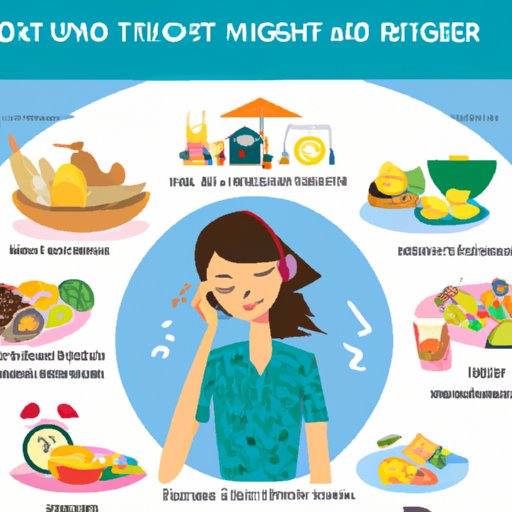Introduction
Night Eating Syndrome (NES) is an eating disorder characterized by a pattern of late-night binge eating or overeating. People with NES often struggle to eat regular meals during the day and rely on nighttime binges to meet their caloric needs. This can lead to feelings of guilt and shame, as well as physical health problems like obesity, diabetes, and heart disease.
If you’re struggling with NES, it can be difficult to know where to start in terms of overcoming the disorder. In this article, we’ll explore some tips on how to stop night eating syndrome, including identifying triggers, creating a consistent sleep schedule, eating balanced meals throughout the day, practicing mindful eating, finding alternative activities, and talking to a healthcare professional.
Identifying Triggers
The first step in overcoming night eating syndrome is to identify what triggers your late-night binges. For some people, emotional triggers, such as stress, anxiety, or sadness, can lead to cravings for food as a way of self-soothing. Other triggers may include fatigue, boredom, or even habit.
Take some time to reflect on what situations tend to trigger your late-night binges. Make a list of these triggers and then brainstorm ways to cope with them without turning to food. For example, if stress tends to cause you to reach for snacks late at night, find other coping strategies such as taking a walk, listening to music, or doing some deep breathing exercises.

Creating a Consistent Sleep Schedule
Another important step in overcoming night eating syndrome is to create a consistent sleep schedule. Not getting enough sleep can lead to increased hunger and cravings, so it’s important to set a bedtime and stick to it. Aim for 7-9 hours of sleep per night.
In addition to setting a bedtime, it’s also important to avoid caffeine, alcohol, and nicotine late at night. These stimulants can interfere with sleep, leading to increased hunger and cravings.
Eating Balanced Meals Throughout the Day
Eating balanced meals throughout the day is another key step in overcoming night eating syndrome. Eating breakfast every morning helps to regulate your appetite and keep your energy levels up throughout the day. It’s also important to eat regular, balanced meals throughout the day, as skipping meals can lead to increased hunger later on.
When planning meals, focus on incorporating a variety of nutrient-dense foods into your diet. This includes lean proteins, healthy fats, complex carbohydrates, fruits, vegetables, and whole grains. Eating a balanced diet helps to regulate your blood sugar levels, which can reduce cravings later on.
Practicing Mindful Eating
Mindful eating is another important step in overcoming night eating syndrome. This involves focusing on the present moment when eating, rather than worrying about the past or future. It’s important to take time to enjoy your food, savoring the flavors, textures, and aromas. This can help to reduce overeating or binging.
It’s also important to pay attention to your body’s cues of hunger and fullness. Eat when you’re hungry and stop when you’re satisfied. This can help to reduce late-night cravings.
Finding Alternative Activities
It’s important to find alternative activities to engage in instead of reaching for food late at night. Reading or taking a walk are two great options that can help to distract from cravings. Doing hobbies or engaging in other activities you enjoy can also be helpful.
If you find yourself struggling with late-night cravings, take some time to explore activities that bring you joy. This could be anything from playing an instrument to painting to writing. Find something that brings you peace and comfort and do it when you’re feeling triggered.

Talking to a Healthcare Professional
If you’re struggling with night eating syndrome, it’s important to seek professional help. Talk to your doctor or a mental health professional about your symptoms and they can help to identify any underlying issues that may be contributing to your disorder. They can also provide resources and treatment options that can help you overcome your NES.
It’s also important to remember that recovery from night eating syndrome is possible. With the right support and resources, you can learn to manage your symptoms and lead a healthier, happier life.
Conclusion
Night eating syndrome is a serious condition that can have a major impact on your physical and mental health. However, with the right strategies, you can learn to manage your symptoms and lead a healthier, happier life. Tips for stopping night eating syndrome include identifying triggers, creating a consistent sleep schedule, eating balanced meals throughout the day, practicing mindful eating, finding alternative activities, and talking to a healthcare professional.
If you’re struggling with night eating syndrome, it’s important to seek professional help. Talk to your doctor or a mental health professional about your symptoms and they can provide resources and treatment options that can help you overcome your NES.
(Note: Is this article not meeting your expectations? Do you have knowledge or insights to share? Unlock new opportunities and expand your reach by joining our authors team. Click Registration to join us and share your expertise with our readers.)
